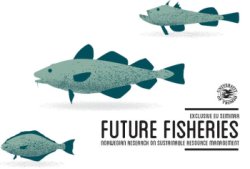A sustainable future for fisheries

Conference “Future Fisheries"
Brussels, 3 October 2012
Commissioner Damanaki intervened at the seminar "Future Fisheries" ![]() [3 MB] , organised in Brussels by the University of Tromsø (UiT). The seminar is to present Norwegian research related to the governance challenges that fisheries management is facing from an international perspective, with a particular focus on European fisheries and the reform of the Common Fisheries Policy.
[3 MB] , organised in Brussels by the University of Tromsø (UiT). The seminar is to present Norwegian research related to the governance challenges that fisheries management is facing from an international perspective, with a particular focus on European fisheries and the reform of the Common Fisheries Policy.

Your Excellency Ambassador Leikvoll, Honourable Members of the European Parliament, Vice-Chancellor Aarbakke, Professors, Ladies and gentlemen,
I would like to thank you for having invited me to this seminar on future fisheries and I would like to start off with recalling what the European Union is faced with today.
The EU is lagging behind the rest of the world when it comes to the sustainable management of our fisheries resources. 68% of EU fish stocks are overfished, but the figure worldwide is only 25%.
We have too many fisheries in EU waters with high discard figures. Those of you who have already ordered once "sole meuniere" in a Brussels restaurant need to know that for every sole that you find on your plate up to 4 times the amount of fish is discarded. Norway has faced this problem years ago.
Sharks can no longer be finned in the US or Taiwan have banned shark finning. But in the EU we have loopholes in our legislation that make it possible for this cruel practise to continue unnoticed.
But we are making progress.
In 2009 we had 5 stocks fished at MSY levels and by today this figure has increased to 27 fish stocks. Thanks to MSY, fishing quotas are increasing.
Our decisions on quotas are now based on scientific data. And whenever we fish outside the EU, we want to make sure that our fishing does not harm either local stocks or local populations.
In the international domain we have also made ground-breaking progress with our new rules against illegal fishing. For all fishery products, a certificate is required to prove that the fish has been caught legally. Illegal products are confiscated – which has proven to be an effective economic deterrent for unlawful operators.
We have been working with third countries to improve compliance with international law; we have conducted extensive investigative work on vessels from both EU and non-EU countries. The process contains clear safeguards for third countries: first they get an explanation of our specific concerns. Only in a second stage could the Council decide on trade measures. We are also working on our own EU list of IUU vessels to complement existing international lists.
We have also just adopted an innovative trade instrument that will allow the Commission to take, on top of the existing rules and in full respect of international law, other trade measures against countries which fish shared stocks unsustainably. We are working very closely to Norwegian government on this. Our alliance, Norway EU alliance, I hope will have some fruitful results in the dialogue for coastal states agreement in North Sea.
Recently, the Commission moved to amend the EU's shark finning ban, so as to close existing loopholes in the legislation. Once our proposal is passed by the European Parliament and Council, the EU will be aligned with the most progressive countries in the world, and will be in a position to promote an effective ban in the relevant international fora such as ICCAT and IOTC.
And we are now the first fishing party in the world to have envisaged the protection of the deep-sea fish at regulatory level: we just adopted a proposal phasing out destructive practices in this delicate environment. I know that Norway too is very sensitive to this issue so I'm sure we will be able to reach a satisfactory understanding on the matter.
I would also like to mention two excellent initiatives, both perfect examples of our good cooperation: the high-grading ban in the North Sea, Skagerrak and Kattegat and the discard ban for the Skagerrak. Here I really need to praise Norway and three of our Member States for the groundbreaking initiative that they have undertaken. Denmark, Sweden and Germany have urged the Commission to put in place a discard ban for the Skagerrak as early as 2013. We have done our part and now the relevant proposal is with the European Parliament and the Council. I can only urge both institutions to listen to these three Member States and to adopt the proposal swiftly. Taking this proposal hostage for whatever political reasons is not the way to go.
These are pioneering initiatives; initiatives that have traced the way for the rest of Europe. Now the idea of a discard phase-out is sinking in.
Ladies and Gentlemen,
The reform of the EU's fisheries policy is also making progress: in January, the European Parliament will adopt its position. I hope that it will be at least as ambitious as the position of the Member States adopted in the Council last June.
For this, we still have a lot of work to do to explain, for example, that reaching maximum sustainable yield and implementing a discard ban is not only possible, but will produce important social and economic benefits already in the short term. This is a key message at times of crisis.
Once Parliament's position is adopted, we will be able to continue negotiations with the Council of Ministers. We hope to be able to finalise the package before the end of next year.
I thank you very much again for having organised this seminar. I am sure that it will be a very useful contribution to the debate in the EU on how our fisheries resources can be managed in a more sustainable way.


